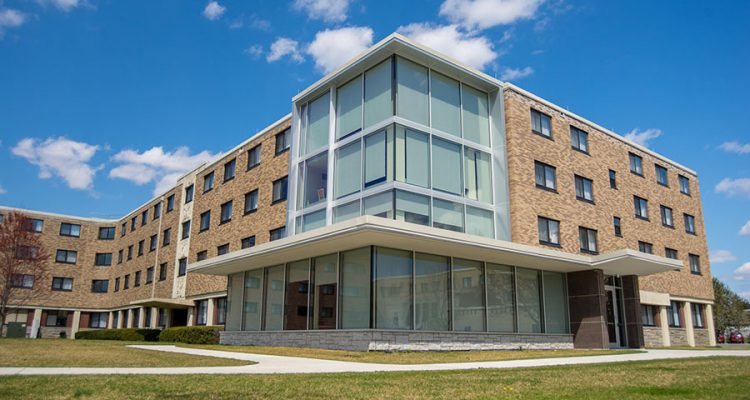Despite its status as a traditional Jesuit institution and the Princeton Review’s ranking of Fairfield in the top 20 most conservative college student bodies in America, Fairfield University’s mission statement declares their intended goal is to create “socially aware and morally responsible persons” through a “liberal education.” The administration, contrary to assumption, has made great advancements towards achieving this mission with gender inclusive housing. They have surpassed the vague Title IX requirements, which state that there must be some form of housing for gender-noncomforming students. Title IX requirements do not state a requirement on the amount of spaces designated for gender-noncomforming students, but Fairfield has more than one and is working on integrating them into the community. As well as this, gender-noncomforming students can choose their roommates, just like everyone else, and have the same rights as any other student. Even though there are a few hurdles to conquer in the next few years for Fairfield to become a more inclusive space, gender inclusive housing is one of the few aspects of the University that follows in the footsteps of its more progressive counterparts.
There are currently five buildings that support gender inclusive housing, including two first year buildings, two sophomore buildings and one junior/senior building.Through communication with the Office of Residence Life, I have found that another building will include gender neutral housing for both sophomores and first years, which further broadens the horizons for those who prefer gender inclusive housing. I personally feel that Fairfield has been making some impressive strides towards a more gender inclusive campus, even though some of the student body may not completely reflect these values due to their conservative leanings and religious values.
As a resident assistant, I am acutely aware of the living situations of residents. I cannot pick where I live next semester, but I have been fortunate enough to be placed in 70 McCormick Hall, which, for the past few years, has been home to the sophomore Service For Justice Leadership Residential College. This social justice oriented group has been moved to 42 Langguth Road, but I am positive the energy of the socially aware residents will carry over throughout the next year. One reason for this is the addition of a gender inclusive restroom on the fourth floor in McCormick. I have the pleasure of knowing the students who campaigned for this, and hopefully, they will be overjoyed to know that that same floor will also support gender inclusive housing next year. Though I will not be the RA for this floor, I am excited to be a part of a community that supports gender inclusivity and open up conversations between residents who may not know much about the non-binary or LGBTQ+ community.
Gender neutral housing presents a wide array of opportunities for students. The most obvious is that people who are nonbinary, meaning that they do not identify as male or female, will be able to live in a safe place with whomever they choose instead of assignments based on sex. This makes nonbinary people feel cared for and safer on campus, which is a feeling that everyone deserve to have. It also allows for a variety of people to foster conversations about the nonbinary community and learn more about how to support their fellow dormmate. It is absolutely imperative that Fairfield ensures the safety of all students, regardless of the general student body’s conservative leanings and the religious values of Catholicism.
Gender inclusive housing has also been an attempt to decrease sexual assault among LGBTQ+ students. This population is more affected by sexual violence than their heterosexual counterparts, and gender inclusive housing would allow for a more inclusive living space, therefore decreasing the rate of sexual violence. Since Fairfield is not as LGBTQ+ friendly as other Connecticut universities, this is a huge stride towards inclusivity and allyship towards their LGBTQ+ students.
I think that LGBTQ+ rights on campus are becoming more of a priority than they once were. Just this year, a group of students changed the fourth floor bathroom in 70 McCormick Road from a women’s restroom to a gender inclusive restroom. There are organizations on campus to support LGBTQ+ students, including the Fairfield University Gender & Sexuality Alliance and the Prevention and Resource Office.
I cannot write enough about how amazing the professors are here – for the most part, all of the professors that I have come across are allies to the community and incorporate inclusivity into their work. Despite the bad reputation of the students (which, in many cases, they prove to be true), there are a lot of students who are allies to the community and want to see justice for their LGBTQ+ friends and colleagues.
Life is hard for nonbinary and transgender people at Fairfield: there’s no questioning that. The Office of Residence Life’s new addition of a gender inclusive floor on 70 McCormick Road is a small action, but it has a huge impact on students who do not identify within the cisgender binary.
Though it is definitely overdue, this is still a great way for students to learn more about peers outside their gender and for nonbinary and transgender people to get access to the housing they need. Hopefully, this will expand to more buildings, especially for upperclassmen (Meditz Hall, Kostka Hall,and Claver Hall could easily incorporate gender inclusive floors and spaces within the buildings), and we can see an increase in gender inclusive housing everywhere.


Leave a Reply